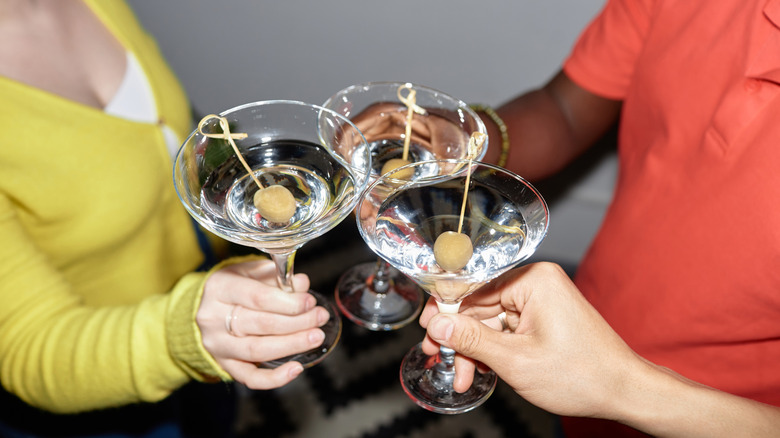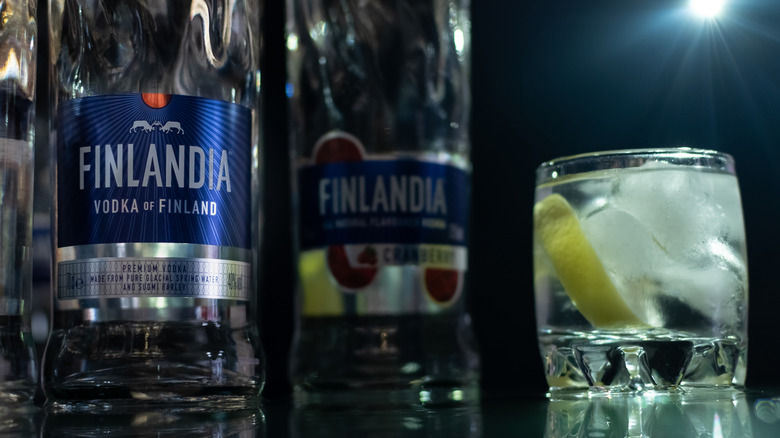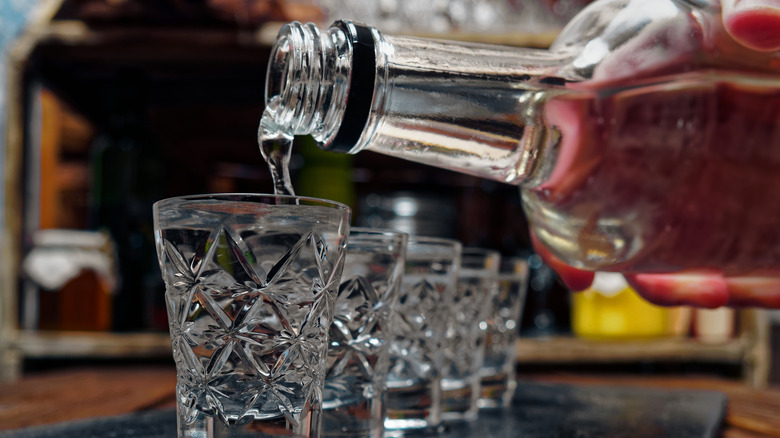Why You Should Drink Vodka Within One Year Of Opening
It's usually pretty easy to polish off a bottle of vodka. After all, there's just enough vodka in a standard 750 milliliter bottle to make about 13 to 17 cocktails, depending on how strong you like them. Invite some friends over, and the bottle will soon disappear. But perhaps vodka isn't something you drink often, or you have a couple bottles left over from a big party you just never seem to get to. Before you reach into the back of the liquor cabinet to mix up a throwback original martini, it's worth knowing how long an opened bottle of vodka lasts. According to mixologist Cody Goldstein, it's best to consume the liquor within a year or two for maximum quality.
Goldstein is the founder and CEO of Muddling Memories, a cocktail consulting and development company he and his wife Camille Parsons Goldstein operate in New York City. Working with brands, events, and bars, Goldstein is known for creating inventive, visually appealing cocktails like a vanilla bean dirty martini sundae. (That's right: olives, vodka, and ice cream.) He spoke exclusively with Chowhound about shelf life and what to expect from a long-ignored bottle of vodka. "An unopened bottle of vodka should never go bad," he notes. "However, once opened, you may be able to keep it for a few years but that may result in a decrease in taste and flavor."
Why there's a time limit on vodka
If you've ever wondered if alcohol actually goes bad, well, it's complicated. Unopened, unflavored distilled spirits like vodka, rum, and bourbon can last indefinitely when stored properly, as long as the seal doesn't get damaged. When a stash of Scotch whiskey from explorer Ernest Shackleton's 1908 Antarctica expedition was unearthed a century later, the whiskey was so well preserved, experts were able to reverse-engineer it and create a modern replica. But the situation changes the minute you crack open a bottle. "While vodka will not 'go bad,'" says Cody Goldstein, "it should be consumed within six to 12 months after opening to enjoy it at its peak freshness."
There are a couple of issues facing that bottle of vodka once you've had a sip or two, or even just removed the lid to smell it. Alcohol evaporates at a lower temperature than water. While its boiling point is 173 degrees Fahrenheit, it's so volatile that it begins evaporating on contact with air, even at room temperature. An 80-proof bottle of vodka is 40% alcohol by volume (ABV), with the rest being water (unless flavors or sweeteners have been added post-distillation). Let it sit long enough and you end up with vodka-flavored water. While the quality and flavor are shot, it won't hurt you.
What to watch for with an opened bottle of vodka
As Cody Goldstein says, vodka doesn't sour or spoil; instead, it declines in quality. However, depending on how it's stored, other factors will influence the flavor over time. "Sunlight and air can also result in oxidizing the spirit which can lead to an undesirable taste and color," he says.
The good news is, not only does most basic liquor not expire, vodka generally has a longer shelf life than brown spirits like rum or bourbon, which possess more complex flavor profiles that can begin to degrade in as little as six months after opening, especially as the bottle gets drained. Nevertheless, there is still a risk of contamination. "Lastly, if you have had a bottle for some time," says Goldstein, "always check the bottom and give it a whirl to make sure no impurities or particles have formed from bacteria in a bottle."
Want to make that tapped bottle of vodka last longer? Keep it cold and out of the light, so both evaporation and oxidation slow down. "Keeping your bottle either refrigerated or in a dark place can help extend the quality of the product once it has been opened," says Goldstein. If you've got just a bit at the bottom of the bottle left, you have other options besides shelving it. Consider adding a shot of vodka to the dough for your next pie crust, or to level up chicken soup.


